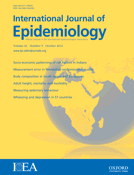
INTERNATIONAL JOURNAL OF EPIDEMIOLOGY
Scope & Guideline
Illuminating trends that shape the future of epidemiology.
Introduction
Aims and Scopes
- Epidemiological Methods:
The journal emphasizes the development and application of innovative epidemiological methods, including causal inference techniques, multivariable and Mendelian randomization analyses, and advanced statistical modeling. - Public Health Research:
Research articles often focus on public health issues such as the impact of environmental factors on health outcomes, infectious disease epidemiology, and the assessment of health interventions. - Chronic Disease Epidemiology:
There is a significant focus on the epidemiology of chronic diseases, including cancer, cardiovascular diseases, and diabetes, often exploring the interaction of lifestyle factors, genetics, and socio-economic determinants. - Global Health Perspectives:
The journal publishes work that examines health disparities and epidemiological trends in diverse populations globally, highlighting the socio-economic and environmental contexts affecting health. - Cohort Studies:
Many articles are based on cohort studies, providing insights into long-term health outcomes and the effects of various exposures on disease incidence and mortality.
Trending and Emerging
- Impact of Climate Change on Health:
Recent publications increasingly address the health impacts of climate change, including heat-related illnesses and the influence of environmental factors on communicable and non-communicable diseases. - COVID-19 Research:
There is a significant increase in studies related to COVID-19, encompassing vaccine effectiveness, long-term health outcomes, and the socio-economic impacts of the pandemic. - Health Inequities and Social Determinants:
Emerging themes focus on the social determinants of health and health inequities, with research exploring how socio-economic status, race, and environmental factors contribute to health disparities. - Integration of Technology in Epidemiology:
The use of digital tools and technologies, such as mobile health applications and big data analytics, is gaining traction, with studies examining their role in disease surveillance and health intervention strategies. - Psychosocial Factors in Epidemiology:
An increasing number of studies are exploring the interplay between mental health and chronic diseases, addressing the psychosocial factors that influence health outcomes.
Declining or Waning
- Traditional Risk Factor Studies:
There has been a noticeable decrease in studies focusing solely on traditional risk factors (e.g., smoking, alcohol consumption) without incorporating modern analytical techniques or broader socio-environmental contexts. - Basic Descriptive Epidemiology:
The journal is moving away from purely descriptive studies that report incidence and prevalence rates without deeper analytical insights or causal interpretations. - Single-Country Focus:
Research focused exclusively on single-country contexts is less prevalent, with a shift towards studies that provide comparative analyses across multiple settings or that address global health issues. - Simple Correlational Studies:
There seems to be a waning interest in simple correlational studies that do not adequately address confounding factors or provide causal inference, as the field increasingly values rigorous methodological approaches.
Similar Journals

OPHTHALMIC EPIDEMIOLOGY
Illuminating Insights in Ocular EpidemiologyOphthalmic Epidemiology, published by Taylor & Francis Inc, stands as a crucial platform in the fields of ophthalmology and epidemiology, with the journal's pivotal contributions recognized in its esteemed category quartiles, ranking Q1 in Ophthalmology and Q2 in Epidemiology for 2023. Since its inception in 1994, the journal has provided a multidisciplinary approach to understanding the distribution and determinants of ocular diseases, thereby informing public health practices and clinical interventions. With a commitment to disseminating high-impact research, it holds a Scopus rank of #45/137 in Ophthalmology and engages a global audience of researchers, practitioners, and students dedicated to advancing the field. Although it is not an open-access journal, Ophthalmic Epidemiology remains a vital resource for innovative studies and reviews that help shape evidence-based strategies to combat vision-related public health issues.

EUROPEAN JOURNAL OF EPIDEMIOLOGY
Transforming data into actionable public health strategies.The European Journal of Epidemiology is a premier peer-reviewed journal published by Springer, specializing in the vast and critical field of epidemiology. With its ISSN 0393-2990 and E-ISSN 1573-7284, this journal has been a leading platform for disseminating high-quality research since its inception in 1985, encompassing a comprehensive range of topics pertinent to public health and epidemiological science. Proudly based in the Netherlands, the journal has secured a prestigious Q1 ranking in the field of Epidemiology and boasts an impressive Scopus rank of #8 out of 148 in its category, placing it in the 94th percentile among its peers. With a commitment to advancing knowledge and practice in epidemiology, the journal provides invaluable insights for researchers, healthcare professionals, and students, facilitating a better understanding of disease distribution and determinants in populations. While it operates under a subscription model, the European Journal of Epidemiology continues to uphold its reputation as an essential resource for innovative research and public health advancements through the years.

Indian Journal of Public Health
Bridging gaps in public health with impactful research.Indian Journal of Public Health, published by Wolters Kluwer Medknow Publications, serves as a pivotal resource in the fields of public health, epidemiology, and health policy. With a history spanning over six decades, since its inception in 1961, this esteemed journal offers significant insights into various health-related issues affecting the Indian population and beyond. As an Open Access journal since 2010, it ensures that crucial research findings are accessible to a global audience, promoting collaboration and knowledge sharing among researchers, professionals, and students. The journal currently holds a respectable status with a 2023 ranking in the Q3 category in epidemiology, health policy, medicine (miscellaneous), and public health, environmental and occupational health, placing it among the noteworthy publications in its field. With impressive Scopus rankings and an aim to drive public health discourse, the Indian Journal of Public Health is an essential platform for those dedicated to advancing public health practices and policies.

Iranian Journal of Public Health
Empowering communities through evidence-based practices.Iranian Journal of Public Health is a premier publication dedicated to advancing the field of public health research. Established in 2001 and published by the Iranian Scientific Society Medical Entomology, this Open Access journal provides an invaluable platform for disseminating innovative findings and practices aimed at addressing public health challenges both locally and globally. With its roots tracing back to 1973, the journal has evolved through multiple converged years, reflecting a rich history of commitment to the health sciences. Currently categorized in Q3 within Public Health, Environmental, and Occupational Health, as per the 2023 rankings, it ranks 406 out of 665 in the Scopus database, placing it in the 39th percentile. This significant positioning underscores its role in fostering high-quality research that informs policy and enhances community health outcomes. The editorial team is dedicated to upholding rigorous academic standards while embracing diverse perspectives that resonate within the dynamic landscape of public health. It is an essential resource for researchers, professionals, and students alike, fostering collaborative efforts in the relentless pursuit of health equity and sustainability.
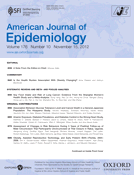
AMERICAN JOURNAL OF EPIDEMIOLOGY
Connecting Researchers to Transform Health PoliciesAmerican Journal of Epidemiology is a premier peer-reviewed journal published by Oxford University Press, focusing on the advancement of epidemiological knowledge and methodology since its inception in 1921. With an ISSN of 0002-9262 and E-ISSN 1476-6256, this influential journal serves as a vital resource for researchers and practitioners worldwide, highlighting significant epidemiological findings and fostering dialogue within the field. Ranked in the Q2 category of Epidemiology and holding a commendable 80th percentile in Scopus' ranking, the journal continues to play a significant role in shaping public health policies and practices. Although the journal is not open access, it remains accessible through institutional subscriptions, ensuring comprehensive discourse on pressing epidemiological issues. By continuously publishing high-quality research that informs disease prevention and control strategies, the American Journal of Epidemiology stands at the forefront of epidemiological inquiry, promoting improved health outcomes on a global scale.

JOURNAL OF EPIDEMIOLOGY AND COMMUNITY HEALTH
Illuminating the path to healthier populations since 1978.JOURNAL OF EPIDEMIOLOGY AND COMMUNITY HEALTH, published by the esteemed BMJ PUBLISHING GROUP, stands as a leading journal in the fields of Epidemiology and Public Health. With an impressive impact factor and ranking in the Q1 quartile for both Epidemiology and Public Health categories as of 2023, it significantly contributes to the dissemination of critical research that shapes public health policies and practices globally. The journal has been a vital resource since 1978, continuously providing an academic platform for the latest advancements and discussions pertinent to community health, environmental concerns, and epidemiological studies. Researchers, professionals, and students alike depend on this influential publication for rigorous peer-reviewed articles, thereby enhancing its reputation as one of the top journals in the field. Despite the absence of Open Access options, the journal's scholarly contributions are evident, making it indispensable for anyone engaged in public health and epidemiological research.
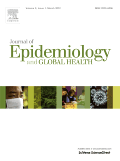
Journal of Epidemiology and Global Health
Empowering researchers to tackle pressing epidemiological issues worldwide.The Journal of Epidemiology and Global Health (ISSN: 2210-6006; E-ISSN: 2210-6014), published by SpringerNature, stands as a premier open-access platform in the field of epidemiology, dedicated to advancing our understanding of global health challenges since 2011. Based in Switzerland, this journal is recognized for its significant contributions to the discipline, achieving an impressive Q1 ranking in Epidemiology and positioning itself at the 88th percentile within the Scopus Medicine - Epidemiology category. With a goal to disseminate innovative research and foster dialogue among scholars, public health professionals, and students, the journal provides a rich repository of empirical studies, reviews, and theoretical contributions that address pressing epidemiological issues. Its commitment to open access ensures that vital research is freely available to the global community, thereby amplifying its impact and relevance. Researchers seeking to publish and access high-quality, peer-reviewed articles will find the Journal of Epidemiology and Global Health an invaluable resource in navigating the ever-evolving landscape of public health.
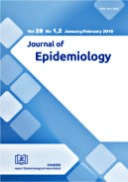
JOURNAL OF EPIDEMIOLOGY
Transforming data into impactful health strategies.JOURNAL OF EPIDEMIOLOGY is a premier peer-reviewed journal published by the JAPAN EPIDEMIOLOGICAL ASSOCIATION dedicated to advancing the field of epidemiology and public health. With an impressive impact factor and recognition as a Q1 journal in both the epidemiology and miscellaneous medicine categories, it ranks in the top percentile of its field, occupying the 28th position out of 148 journals in epidemiology according to Scopus. Since its inception in 1991, this open access journal has provided researchers, practitioners, and students with valuable insights and findings that shape healthcare policies and practices globally. The journal covers a broad range of topics within epidemiology, fostering a multidisciplinary approach to understanding and addressing health challenges. With a commitment to high-quality research and accessibility, the JOURNAL OF EPIDEMIOLOGY plays a crucial role in the dissemination of knowledge and best practices within the public health community.

EPIDEMIOLOGY
Illuminating critical trends in health and disease dynamics.EPIDEMIOLOGY, published by Lippincott Williams & Wilkins, stands as a vital resource in the field of epidemiological research. With its ISSN 1044-3983 and E-ISSN 1531-5487, this journal has been a cornerstone for scholars since its inception in 1990. Covering a wide array of topics within the domain, it strives to disseminate cutting-edge findings that inform public health policies and clinical practices. Currently ranked Q3 in Epidemiology and positioned at #33 out of 148 according to Scopus, the journal boasts an impressive 78th percentile rank, reflecting its significance and impact within the academic community. Though not open access, EPIDEMIOLOGY provides robust access options for institutional subscribers, ensuring that critical epidemiological insights reach a broad audience. As this field continues to evolve, the journal remains dedicated to empowering researchers, practitioners, and students with the knowledge necessary to advance public health initiatives and improve population health outcomes.
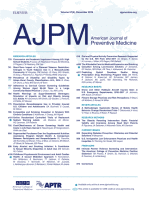
AMERICAN JOURNAL OF PREVENTIVE MEDICINE
Transforming epidemiology into actionable health solutions.AMERICAN JOURNAL OF PREVENTIVE MEDICINE is a premier publication in the fields of Epidemiology and Public Health, published by Elsevier Science Inc. With a commendable impact factor and ranking within the top quartile for both Epidemiology and Public Health categories, this journal serves as a vital source of cutting-edge research, reviews, and critical insights aimed at promoting health and preventing disease. Since its inception in 1985, the journal has been dedicated to disseminating high-quality articles that inform health policy, improve clinical practices, and enhance community health initiatives. It is readily available to researchers and professionals committed to advancing their knowledge and practice, ensuring the continued evolution of preventive medicine. The journal's reach and influence, underscored by its impressive rankings, position it as an essential resource for those looking to make a meaningful impact in the world of preventive health.